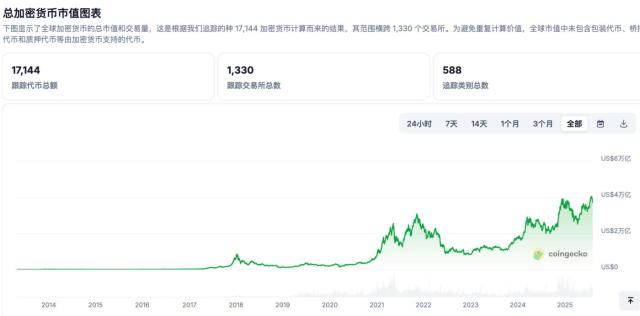Written by: Matt Hougan, Chief Investment Officer of Bitwise
Translated by: Luffy, Foresight News
Last week, SEC Chairman Paul Atkins delivered a speech titled "U.S. Leadership in the Digital Financial Revolution" at the American Priority Policy Institute.
You should read it right now. Really, don't hesitate. This speech is essentially an investment roadmap for the next five years.
In the speech, Atkins outlined a vision for future financial markets. Spoiler alert: everything will revolve around public chains like Ethereum. He proposed:
All assets (stocks, bonds, dollars, etc.) will ultimately migrate to public chains;
Decentralized Finance (DeFi) will play a crucial role in the future;
Crypto assets and blockchain can generate exciting new business models;
The main factor hindering this "revolution" was a hostile regulatory environment, which has now completely turned 180 degrees.
This is the most comprehensive vision I've read about how cryptocurrencies will reshape financial markets.
After reading this speech, it's hard not to want to allocate a large amount of funds to the crypto sector. If you work in finance, you might even want to shift the focus of your career here. The SEC Chairman has condensed all the essential insights proposed by crypto supporters over the past decade, and detailed how the SEC will help these concepts come to fruition.
"This is an opportunity that comes once in a generation," he wrote in the speech. A few years ago, I wasn't even sure if compliance departments would allow me to say something like this.
What This Means for Investors
For investors, there's so much to unpack in this speech. You could start a venture capital firm around Atkins' vision, creating enterprises for each opportunity he mentioned. But in my view, three investment opportunities stand out.
Opportunity One: Ethereum (and Other Layer 1 Blockchains)
The most obvious opportunity is investing in Ethereum and other Layer 1 blockchains that support stablecoins and asset tokenization.
"Today, I announce the launch of 'Project Crypto,'" Atkins said, "a full commission initiative aimed at updating securities regulations to allow U.S. financial markets to migrate on-chain."
It's not hard to see: if almost all assets will migrate to public chains, you'll want to position yourself in these chains.
Which blockchains are worth watching? The best strategy might be to buy a basket of mainstream assets: Ethereum, Solana, Cardano, XRP, Avalanche, Aptos, Sui, NEAR, and so on.
I know some readers will say: Ethereum is obviously the dominant chain for tokenization and stablecoins. I agree! It's in the lead. But looking back to the rise of digital trading in the early 2000s - the last major upgrade of the financial system - early market leaders were companies like Island ECN and Instinet.
Have you heard of these names recently? Neither have I. But Nasdaq's stock price has risen 2,275% since its listing in July 2002.
Instead of trying to pick a single target, an index strategy of buying a basket of assets would cover future top projects.
Opportunity Two: "Super Apps" like Coinbase and Robinhood
The most guidance-rich part of the speech was the section titled "Driving Super Apps: Horizontal Integration of Product Services". Atkins painted a future where a single app could provide comprehensive financial services for customers.
Atkins stated: "Broker-dealers with alternative trading systems should be able to simultaneously offer non-security crypto assets, crypto asset securities, traditional securities trading, and services like crypto asset pledging and lending, without obtaining licenses from over 50 states or multiple federal licenses."
Reading this part, it's hard not to think of Coinbase and Robinhood, both of which are implementing the super app concept from different starting points: Coinbase began in crypto and is expanding towards traditional assets, while Robinhood started with traditional assets and is rapidly moving into crypto.
I dare to predict: one of these companies might become the world's largest financial services company, possibly the first financial services company to break the $1 trillion market cap. Atkins has just outlined their roadmap.
Opportunity Three: DeFi Applications
The third prominent opportunity in Atkins' speech is Decentralized Finance (DeFi).
DeFi applications have always been in a regulatory gray area, neither explicitly allowed nor prohibited by existing regulations. This has limited their development: while widely used by crypto enthusiasts, mainstream investors and institutions have barely touched them.
In the section titled "Unleashing U.S. Market Potential: A Vast and Sophisticated On-Chain Software System", Atkins explained why regulators have struggled to understand DeFi:
"Decentralized financial software systems (like automated market makers) facilitate automated, disintermediated financial market activities. Federal securities laws have always assumed the existence of intermediaries that need regulation, but this doesn't mean we should forcibly introduce intermediaries when the market can operate without them."
In other words: DeFi is not just a technological revolution, but a conceptual one. And the SEC Chairman understands this.
Despite lacking regulatory clarity, DeFi application usage is already substantial. The largest spot trading application Uniswap reached $88 billion in trading volume in June, a historical high; DeFi lending protocols like Aave have also set records with $56 billion in total value locked; Derivatives platforms like Hyperliquid are equally massive.
With clearer regulation, could these numbers grow 10 times? 50 times? 100 times? As traditional and crypto markets merge, the opportunities in DeFi are immense.
Critics point out that most DeFi tokens lack clear economic association with their underlying protocols. For example, Uniswap's UNI token is a "governance token": meaning holders can vote on the protocol's development direction but cannot benefit from platform trading fees.
I suspect this is a legacy of the previously hostile regulatory environment. Under the SEC's new vision, assets like UNI might establish more direct economic connections with their underlying protocols, unlocking massive value.
Core Question: Is This Already Priced In?
The most obvious question about Atkins' vision is: Is this already reflected in prices? If the market has long anticipated the SEC's transformation from crypto opponents to "catalysts", then assets like Ethereum, Solana, and Uniswap should already reflect this.
Perhaps. But what I want to say lastly is: this speech caught me by surprise.
For the past eight years, I've been researching and writing about cryptocurrencies, always bullish about their future, and have previously said that all assets will ultimately migrate to blockchain. But after reading this speech, I realized my perspective wasn't broad enough, and I need to accelerate my action plan.
If even I didn't anticipate this, I think others won't have either.





